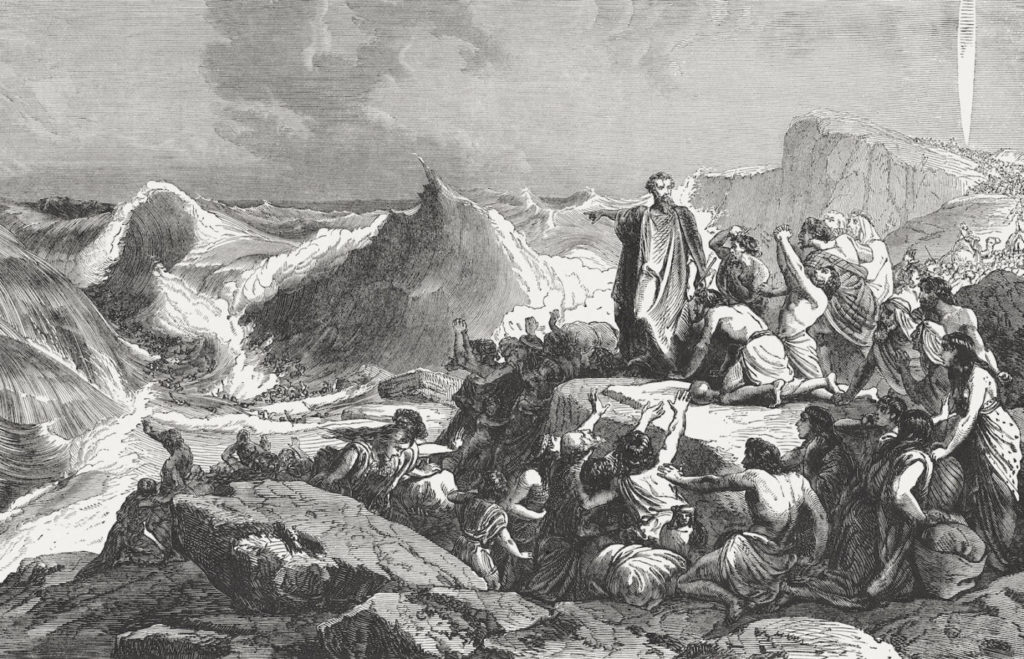
So often, people try to divide the New Testament from the Old with boundaries that do not exist. One such division is that the Old Testament is just about rules and regulations, and it is not until Christ comes that we see the God of grace and mercy. I would like us to consider how we see elements of the gospel in the exile of the Jews from Egypt as they journey to the Promised Land. I’m not arguing that we see the full and clear picture that we are given later in the New Testament (after all the gospel is called a mystery, not because it was hard to understand, but because until the revelation of Christ it was not fully known).
I Chose You
In the second telling of the law (Deuteronomy), God is rehearsing His warning not to turn away from Him. He reminds the people that they are a holy people (holy means set apart and different for a special purpose), and that God chose them to be HIS people from all the earth. Comments like that can really get someone puffed up pretty quickly. Wow, God chose me. There must be something special about me. But then God reminds them that His love for them had nothing to do with their actions but His unidirectional love that He had toward them in His election.
The Lord did not set His love on you nor choose you because you were more in number than any of the peoples, for you were the fewest of all peoples, but because the Lord loved you and kept the oath which He swore to your forefathers, the Lord brought you out by a mighty hand and redeemed you from the house of slavery, from the hand of Pharaoh king of Egypt. (Deuteronomy 7:7–8)
This truth holds fast even today as we consider why God calls certain people to Himself. God is not calling just the smart people, the good-looking people, the hard-working people, the rich people, the thoughtful people, and so on. No, God is calling a people to Himself because of the love that He has toward them.
Rehearsing of God’s One Directional Action
We often miss it when we read in our Bibles, but frequently before God tells His children to do something or act a certain way, He reminds them of what He has done. Take for example the opening of the Ten Commandments. It starts by reminding the people, “I am the Lord your God, who brought you out of the land of Egypt, out of the house of slavery.” (Exodus 20:2) When the children of God were brought out of Egypt (Ex. 13:3) they were told to remember that day and what God had done. They were to tell their children for future generations about this amazing event that God had done. This was the purpose of the Passover meal that Jews celebrate even to this day. God worked mightily, but alone, as He delivered the people of Israel. All they needed to do was trust God and walk by faith. D.A. Carson has pointed out that it is not the intensity of the faith, but the object of the faith that saves. Meaning, some of the Jews may have been fearful, may not have had the largest amount of faith (if one could quantify), and yet God moves to save His people. God did not ask them to raise even one sword to be saved.
The same is true of our salvation in Christ. All we are called to do is trust in the good work of Christ on the cross, and God will take care of the rest. Like the people of Israel, God saves us today. without our lifting a single hand. He does not ask us to do x, y, or z. No, all we must do is repent and believe in the cross of Christ as we place ourselves under His Lordship.
God’s Forgiveness
Sometimes folks like to talk about the Old Testament and the New Testament like God had a change of heart. In the Old Testament He was this mean old man killing everyone, and in the New Testament Christ preaches love and forgiveness. Such simplistic characterizations not only are dangerous, but miss how often God forgives His people. After Moses is given the Law, he is told to go down the mountain because Israel had made a golden calf and begun to prostitute itself. The people had violated the covenant before the ink had even dried, or perhaps in this case the tablets had cooled. God’s righteous judgement was that the people should be destroyed for their rebellion, and yet in Exodus 32:15 He relents. He turns away from His wrath, a wrath that ultimately Jesus Christ would bear. This is not a one-time pattern. Over and over we see the children of God turn from worship of the Lord to other gods (just look at how silly the book of Judges is), and time and time again, God forgives His people.
Much more could be said about how we see glimpses of the gospel and the character of God in the Old Testament. If you have not done so in the last few years, make it a point to read through the entire Old Testament. Look for echoes and shadows of the mystery that is to be revealed (Col. 1:26) and rejoice in a God who has not changed since the foundations of the world.
 Church
Church